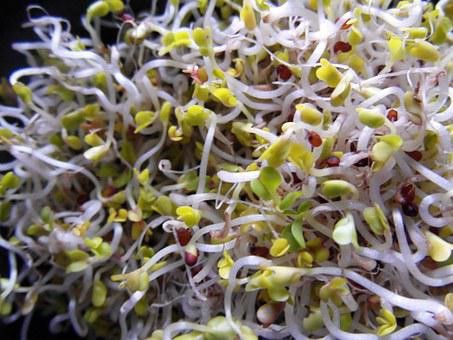This is a guest post by Prudence Sinclair.
Hello Lovely YOU!
Spring has finally arrived, which means many gardeners have already begun starting their vegetable plants from seeds. If you garden, you know how exciting it is to finally see those tiny, delicate green seedlings begin to sprout up from the soil.
What you may not know is that plant sprouts are loaded with powerful nutrients that can be very beneficial to our health. No, they are not just something from your local salad bar – these sprouts are often real medicine.
Case in point: broccoli sprouts.
Until fairly recently, no one had ever heard of or given any thought to broccoli sprouts. We certainly weren’t looking at them as a major player in the fight against cancer.
But that all changed in 1997 when a group of scientists at the John Hopkins University School of Medicine made a breakthrough discovery: these tiny little sprouts contain ten to 100 times more Sulforaphane than mature broccoli.
What Makes Sulforaphane so Powerful?
Scientists have known about the health benefits of sulforaphane for quite some time. It’s this plant compound that makes cruciferous vegetables so incredibly healthy.
Sulforaphane is a sulfur-rich compound and has been found to have cancer-fighting properties. Raw veggies have the highest levels of this beneficial plant compound. In fact, one study found that raw broccoli had 10x the amount of sulforaphane than cooked broccoli.
It turns out our bodies have a stress-response pathway, known as NRF2. This pathway controls over 200 genes in our body that are responsible for anti-inflammatory and antioxidant processes. Find something that activates this pathway and you’ve found a way to suppress inflammation, activate detoxification, and encourage antioxidants to “do their thing.”
It just so happens sulforaphane activates that pathway!
While adult broccoli, cabbage, cauliflower and Brussel sprouts contain sulforaphane, broccoli sprouts contain 100-400 times the amount!
But Can Broccoli Sprouts Really Fight and Prevent Cancer?
Since 1997, broccoli sprouts have been vigorously studied. They have been found to do everything from help your heart, support strong bones, improve respiratory function, protect your brain and more.
But their real power lies in their ability to fight and prevent certain cancers. The sulforaphane I mentioned inhibits the function of phase 1 enzymes, which activate pro-carcinogens (substances that turn into carcinogens that begin cancer). The compound then goes on to activate phase II enzymes, which are the good guys that help detoxify your body of potential carcinogens and other disease-causing compounds.
Here are some of the specific cancers broccoli sprouts have been shown to fight in scientific studies:
Throat Cancer
Animal studies have found that broccoli sprouts protect against oral cancer, specifically head and neck squamous cell carcinoma.
Lung Cancer
A 2005 study with mice found that sulforaphane had the ability to prevent lung cancer caused by tobacco carcinogens.
Colon Cancer
Lab studies have found that broccoli sprouts, specifically the sulforaphane within, causes cell death and permanent DNA breakage in colon cancer cells while leaving the surrounding healthy cells unaffected! While not currently implemented as a form of cancer treatment, the future of science and medicine may yet develop a way.
Prostate Cancer
The selenium in broccoli sprouts has been found to stop the expression of a protein that negatively affects the immune system, allowing cancers like prostate cancer, melanoma and leukemia to flourish.
Breast Cancer
A mouse study found that sulforaphane stops the growth of breast cancer stem cells and may even be able to stop cells from growing in the first place.
Bladder Cancer
Another mouse study found broccoli sprout extract may slow and top the spreading of bladder cancer.
Skin Cancer
And finally, animal studies have also found promising results with broccoli sprouts’ ability to protect against skin cancer! Boy did I wish I knew about these wonderful seeds before I was diagnosed with malignant melanoma years ago. I just bought more supplies from Hippocrates Institute and after 6 hours of soaking in purified water they will be ready to start sprouting and I will get to enjoy them on my salads this weekend. Yummy!
Should You Grow or Take a Supplement?
Now that you know how wonderful these little sprouts are, you may be wondering how to go about getting them into your diet. Well, you have the option of growing the sprouts yourself or finding a quality supplement and taking that instead.
If you are someone that loves growing vegetables, then this may be the best option. It’s easy to do, though takes some diligence, and this is the cheaper option. You can eat ½ to a cup of these sprouts a day to gain the benefits.
However, if you don’t have a green thumb and know you won’t commit to the daily and weekly process of growing the sprouts, then I would suggest finding a quality supplement.
Nature is wonderful, always providing us with the medicine we need to stay healthy!
Happy Spring! Happy Sprouting!
Prue


